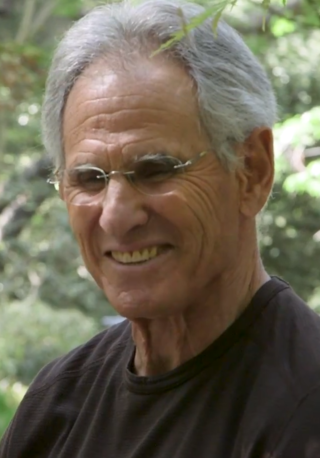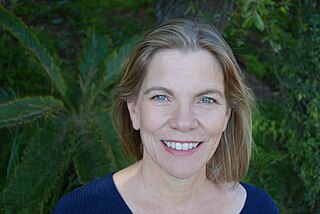Gina M. Biegel | |
|---|---|
| Born | Gina M. Biegel |
| Occupation | Author, Psychotherapist |
| Language | English |
| Citizenship | American |
| Alma mater | Santa Clara University |
Gina M. Biegel is an American author and psychotherapist.
Gina M. Biegel | |
|---|---|
| Born | Gina M. Biegel |
| Occupation | Author, Psychotherapist |
| Language | English |
| Citizenship | American |
| Alma mater | Santa Clara University |
Gina M. Biegel is an American author and psychotherapist.
Gina M. Biegel is a graduate of Santa Clara University. She is the author of The Stress Reduction Workbook for Teens. Biegel is a Licensed Marriage and Family Therapist (LMFT) specializing in mindfulness-based stress reduction. She is also the director of research for Mindful Schools. [1]

Meditation is a practice in which an individual uses a technique – such as mindfulness, or focusing the mind on a particular object, thought, or activity – to train attention and awareness, and achieve a mentally clear and emotionally calm and stable state.
Mindfulness is the practice of purposely bringing one's attention to the present-moment experience without evaluation, a skill one develops through meditation or other training. Mindfulness derives from sati, a significant element of Hindu and Buddhist traditions, and is based on Zen, Vipassanā, and Tibetan meditation techniques. Though definitions and techniques of mindfulness are wide-ranging, Buddhist traditions explain what constitutes mindfulness such as how past, present and future moments arise and cease as momentary sense impressions and mental phenomena. Individuals who have contributed to the popularity of mindfulness in the modern Western context include Thích Nhất Hạnh, Herbert Benson, Jon Kabat-Zinn, Richard J. Davidson, and Sam Harris.

Jon Kabat-Zinn is an American professor emeritus of medicine and the creator of the 'Stress Reduction Clinic' and the 'Center for Mindfulness in Medicine, Health Care, and Society' at the University of Massachusetts Medical School. Kabat-Zinn was a student of Zen Buddhist teachers such as Philip Kapleau, Thich Nhat Hanh, and Seung Sahn, and a founding member of Cambridge Zen Center. His practice of yoga and studies with Buddhist teachers led him to integrate their teachings with scientific findings. He teaches mindfulness, which he says can help people cope with stress, anxiety, pain, and illness. The stress reduction program created by Kabat-Zinn, mindfulness-based stress reduction (MBSR), is offered by medical centers, hospitals, and health maintenance organizations, and is described in his book Full Catastrophe Living.
Mindfulness-based cognitive therapy (MBCT) is an approach to psychotherapy that uses cognitive behavioral therapy (CBT) methods in collaboration with mindfulness meditative practices and similar psychological strategies. The origins to its conception and creation can be traced back to the traditional approaches from East Asian formative and functional medicine, philosophy and spirituality, birthed from the basic underlying tenets from classical Taoist, Buddhist and Traditional Chinese medical texts, doctrine and teachings.

The psychological and physiological effects of meditation have been studied. In recent years, studies of meditation have increasingly involved the use of modern instruments, such as fMRI and EEG, which are able to observe brain physiology and neural activity in living subjects, either during the act of meditation itself or before and after meditation. Correlations can thus be established between meditative practices and brain structure or function.
Self-compassion is extending compassion to one's self in instances of perceived inadequacy, failure, or general suffering. Kristin Neff has defined self-compassion as being composed of three main elements – self-kindness, common humanity, and mindfulness.
Prenatal stress is exposure of an expectant mother to psychosocial or physical stress, which can be caused by daily life events or by environmental hardships. Mental health issues, such as maternal depression, affect 10-20% of women and are linked to a variety of negative child outcomes.

Susan Kaiser Greenland(born October 1, 1956) is an American author and teacher of mindfulness and meditation, practicing a state of present-moment awareness to develop overall attentiveness and social/emotional skills. Susan played a foundational role in making mindfulness practices developmentally appropriate for young people, and with her first book The Mindful Child she helped pioneer activity-based mindfulness. This technique is now practiced in American schools throughout the country to help children learn how to reduce and alleviate their stress levels.
Mindfulness-based stress reduction (MBSR) is an eight-week evidence-based program that offers secular, intensive mindfulness training to assist people with stress, anxiety, depression and pain. Developed at the University of Massachusetts Medical Center in the 1970s by Professor Jon Kabat-Zinn, MBSR uses a combination of mindfulness meditation, body awareness, yoga and exploration of patterns of behaviour, thinking, feeling and action. Mindfulness can be understood as the non-judgmental acceptance and investigation of present experience, including body sensations, internal mental states, thoughts, emotions, impulses and memories, in order to reduce suffering or distress and to increase well-being. Mindfulness meditation is a method by which attention skills are cultivated, emotional regulation is developed, and rumination and worry are significantly reduced. During the past decades, mindfulness meditation has been the subject of more controlled clinical research, which suggests its potential beneficial effects for mental health, as well as physical health. While MBSR has its roots in Buddhist wisdom teachings, the program itself is secular. The MBSR program is described in detail in Kabat-Zinn's 1990 book Full Catastrophe Living.
Shauna L. Shapiro is a professor of psychology at Santa Clara University who works on mindfulness.

Amishi Jha is a professor of psychology at the University of Miami.
Headspace, a subsidiary of Headspace Health, is an English-American online company, specializing in meditation. It was incorporated in May 2010 in London, England, by Andy Puddicombe and Richard Pierson. It is headquartered in Santa Monica, California, with offices in San Francisco and London.
Janice Marturano is an author, former vice president at General Mills, and founder and executive director of the Institute for Mindful Leadership, a non-profit organization that educates business and organizational employees on strengthening the fundamentals of leadership excellence through mindfulness meditation, contemplative leadership practices and their practical applications in the workplace.
Linda E. Carlson is a Canadian clinical psychologist. She is a professor at the University of Calgary, where she holds the Enbridge Research Chair in Psychosocial Oncology.
Trauma-sensitive yoga is yoga as exercise, adapted from 2002 onwards for work with individuals affected by psychological trauma. Its goal is to help trauma survivors to develop a greater sense of mind-body connection, to ease their physiological experiences of trauma, to gain a greater sense of ownership over their bodies, and to augment their overall well-being. However, a 2019 systematic review found that the studies to date were not sufficiently robustly designed to provide strong evidence of yoga's effectiveness as a therapy; it called for further research.

Mindful Yoga or Mindfulness Yoga combines Buddhist-style mindfulness practice with yoga as exercise to provide a means of exercise that is also meditative and useful for reducing stress. Buddhism and Hinduism have since ancient times shared many aspects of philosophy and practice including mindfulness, understanding the suffering caused by an erroneous view of reality, and using concentrated and meditative states to address such suffering.

BreathworksCIC is an international mindfulness organization founded in the United Kingdom, which offers mindfulness-based approaches to living well with pain, stress, and illness. It is known particularly for developing the approach of mindfulness-based pain management (MBPM), which shares many elements with mindfulness-based stress reduction (MBSR) but is adapted specifically for those living with chronic pain and illness, and incorporates a distinctive emphasis on the practice of 'loving-kindness'. Breathworks is a registered Community Interest Company (CIC) in the United Kingdom, and has nearly 500 accredited teachers working in 35 countries.

Prudence Margaret Burch, known professionally as Vidyamala Burch, is a mindfulness teacher, writer, and co-founder of Breathworks, an international mindfulness organization known particularly for developing mindfulness-based pain management (MBPM). The British Pain Society has recognized her "outstanding contribution to the alleviation of pain", and in 2019, 2020, 2021 and 2022 she was named on the Shaw Trust Power 100 list of the most influential disabled people in the UK. Burch's book Mindfulness for Health won the British Medical Association's 2014 Medical Books Award in the Popular Medicine category.
Mindfulness-based pain management (MBPM) is a mindfulness-based intervention (MBI) providing specific applications for people living with chronic pain and illness. Adapting the core concepts and practices of mindfulness-based stress reduction (MBSR) and mindfulness-based cognitive therapy (MBCT), MBPM includes a distinctive emphasis on the practice of 'loving-kindness', and has been seen as sensitive to concerns about removing mindfulness teaching from its original ethical framework. It was developed by Vidyamala Burch and is delivered through the programs of Breathworks. It has been subject to a range of clinical studies demonstrating its effectiveness.

Full Catastrophe Living: Using the Wisdom of Your Body and Mind to Face Stress, Pain, and Illness is a book by Jon Kabat-Zinn, first published in 1990, revised in 2013, which describes the mindfulness-based stress reduction (MBSR) program developed at the University of Massachusetts Medical Center's Stress Reduction Clinic. In addition to describing the content and background of MBSR, Kabat-Zinn describes scientific research showing the medical benefits of mindfulness-based interventions (MBIs), and lays out an approach to mind-body medicine emphasizing the depth of the interconnections between physical and mental health. The book has been called "one of the great classics of mind/body medicine", and has been seen as a landmark in the development of the secular mindfulness movement in the United States and internationally.